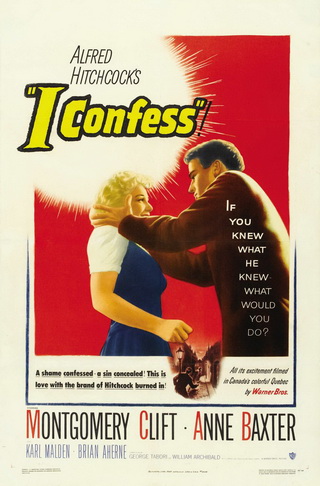Before The Fall-Before
The Garden Of Eden Fell Into Disrepair-Sir Alfred Hitchcock’s “I Confess”
(1953)-A Film Review
DVD Review
By Lenny Lynch
I Confess, starring
Montgomery Clift, Anne Baxter, directed
by Sir Alfred Hitchcock, 1953
I admit, freely admit
that I am a lapsed, very lapsed Catholic of the Roman persuasion although that
is no factor in the how or why of drawing this review of an Alfred Hitchcock
minor classic I Confess set in
Catholic Canada, French-Canadian Canada, Quebec, which is actually a separate
country or could be if the Quebecois wanted such an outcome as many have
demonstrated for in the past, where my good friend and mentor Josh Breslin’s
people came from a couple of generations back. What does factor in is the still
scarred, scary, bizarre ritual (ritualistic cleansing at least) memoires of
facing the inquisition in the confessional box in the person of the parish
priest, one Father Lally who was one son of a bitch on dragging out every last
sin out off his charges and pronouncing high dungeon penance that would make
many a knee weary down at the blessed altar rail. (Many years later it came
out, came out during the scandalous cover-ups and then exposes of the sodomites
in the pulpits in the Boston Catholic diocese that good old Father Lally was
giving absolution gratis for his favored boys who confessed to all kinds of
sexual fantasy sins that the bastard then made them pay for scarring at least
one of maybe two generations of innocent boys. He died before any of them got
any satisfaction of seeing his crimes exposed and sent prison bound. Money will
never wash away the crimes against humanity that Father Lally inflicted on this
troubled world. As least for believers there is the satisfaction that he will
burn in hell for eternity and maybe a few can get some solace from that.)
But all that has nothing
to do with the plot of the film except that the sanctity of the confessional,
the so-called penitent-priest confidentially plays a big role in this film. A
rather extreme way that the privilege which after all is a legal privilege in a
court of law and no something church ordained although maybe it had its roots
in that way back when which can be looked at. Penitent X (I don’t want to
violate that sanctity even as a lapsed, very lapsed Catholic) has committed
murder, maybe not murder one but murder nevertheless and maybe murder one if X
had done it in the act of a robbery which would make it felony murder. He and
his wife work for Priest A, played by Montgomery Clift, at the rectory and
after he committed the dastardly crime he confessed in the confessional to
Priest A. He is home free or at least he thinks he is since he has some kind of
understanding that Priest A will not snitch on him to the coppers, and he
doesn’t.
Where things get dicey
is that way back when before he was ordained, before he got “religion” after
being in the military during World War II he had a torrid affair with a woman
who subsequently married somebody else but was still in love him. Why that matters
is that she and Priest A were seen together the night of the murder and he
can’t explain where he was at the time of the murder. Looks like the big
step-off for a guy just doing his job. Things get a little better after a trial
in which the good priest is found not guilty although that standard is not the
same as innocent and the festering parishioners are ready to nail his ass to
the wall over the romance stuff. Before they can get the tar out though
Penitent X’s wife tells all her husband was the murderer and for that act of
sanity he kills her and then runs like a bastard to get away. No way will he do
so though as the coppers nab the bastard and he buys nothing but six feet of
hard dirt for his troubles. Yeah, nothing here made me want to jump back on the
priest-ridden bandwagon as much as I hate to see an innocent guy, a
straight-laced priest with a sullen past come close to the big step-off.

No comments:
Post a Comment